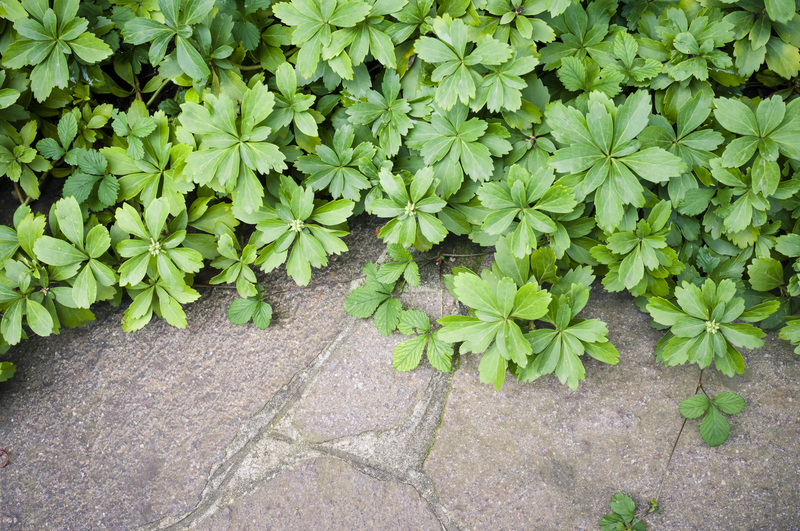Transform Your Outdoor Space with Zen Garden Concepts
Looking to create a peaceful sanctuary in your own backyard? Zen garden concepts provide an ideal way to transform your outdoor space into a haven of tranquility and mindful beauty. Embracing both Japanese tradition and modern landscaping ideas, a Zen garden can help you escape daily stress, foster mindfulness, and add a stunning focal point to your home's exterior. This comprehensive guide explores everything you need to know to transform your outdoor space with Zen garden concepts.

Understanding the Philosophy of Zen Gardens
Zen gardens, also known as karesansui or Japanese rock gardens, are deeply rooted in Buddhist principles emphasizing simplicity, balance, and meditation. By distilling nature to its essential elements--rocks, gravel, sand, and sparse greenery--these gardens create an environment that encourages reflection and calm.
- Simplicity: Minimalism is key in Zen design, fostering peace without excess clutter.
- Symbolism: Every element in a Zen garden carries a meaning, from rocks representing mountains to raked sand mimicking water.
- Mindfulness: The act of creating and maintaining a Zen garden is as important as enjoying its beauty, offering an ongoing opportunity for mindful meditation.
Why Choose a Zen Garden for Your Outdoor Space?
If you seek a serene retreat, practicing mindfulness, or simply want an eye-catching landscape design, integrating a Zen garden concept into your yard boasts many benefits:
- Low Maintenance: Zen gardens require minimal upkeep compared to traditional lawns or flower beds.
- Year-Round Appeal: Their evergreen elements provide beauty through all seasons.
- Customization: Easily adapts to small patios, spacious yards, or even modern rooftops.
- Boosts Property Value: A unique garden design increases curb appeal and makes your property stand out.
Key Elements of Zen Garden Concepts
Creating an authentic Zen ambiance goes beyond just placing rocks and sand. The following elements are essential to truly transform your outdoor space using Zen garden ideas:
1. Stones and Rocks
Stones serve as the backbone of every Zen garden. Choose shapes and sizes that blend organically. Avoid symmetry; instead, opt for natural grouping, reflecting the randomness of nature.
- Standing stones represent mountains or islands.
- Flat rocks may symbolize water surfaces or shores.
- Gravel or sand represents water--raked into patterns to illustrate ripples or waves.
2. Sand and Gravel
The signature feature of Zen gardens involves expanses of white gravel or sand. These surfaces serve both an aesthetic and meditative purpose. Raking patterns into the sand symbolizes flowing water and helps clear the mind through repetitive motion.
- Fine-grained sand offers a smooth surface for intricate patterns.
- Crushed gravel is durable and creates visually striking textures.
3. Moss, Groundcovers, and Minimalist Plants
While lush greenery isn't typical in Zen gardens, carefully placed patches of moss, ferns, or low groundcovers add a touch of life and texture.
- Moss imparts a lush, peaceful appearance, flourishing in shady areas.
- Bamboo screens can provide privacy without breaking the garden's simplicity.
- Evergreen shrubs like azaleas or Japanese maples add understated color and interest.
4. Water Features
Actual water isn't mandatory, but small koi ponds or stone basins enhance authenticity and serenity. If space is limited, a simple bamboo fountain (called a shishi-odoshi) adds soothing sound and a contemplative atmosphere.
5. Pathways and Bridges
Stone or gravel paths contribute both practicality and symbolism, guiding visitors on a "journey" through your Zen space. Small wooden or stone bridges can span dry stream beds or gravel rivers, inviting contemplation along the way.
6. Ornaments and Focal Points
Keep decorative elements understated. Lanterns, pagodas, or simple stone statues serve as points of focus, but less is always more in Zen style.
Designing Your Zen Garden: Step-by-Step Guide
Ready to transform your outdoor space with a Zen garden concept? Here's a step-by-step process to help you design a harmonious landscape, whether you have a compact patio or a sprawling yard.
Step 1: Assess Your Space
Begin by evaluating your available space and sunlight. Zen gardens can be scaled to any size, so don't be deterred by constraints. Sketch out your layout, considering focal points and how people will move through the space.
Step 2: Define Boundaries
Demarcate your Zen garden area with bamboo fencing, natural wood, or stones. Defining boundaries creates a sense of enclosure and helps the garden feel set apart from the rest of your yard.
Step 3: Place Rocks and Stones
Arrange your rocks in odd-numbered groupings for a natural feel. Avoid symmetrical or geometric patterns. Each stone should have a purpose: anchor stones, supporting stones, and decorative features.
Step 4: Spread Sand or Gravel
Once the stones are in place, distribute a layer of white sand or pale gravel across the garden area. Rake around the stones to create patterns representing flowing water or ripples.
Step 5: Incorporate Plants Mindfully
Introduce moss, groundcovers, or minimalist shrubs sparingly. Place them strategically to soften the look of rocks or to highlight a focal area.
Step 6: Add Water Features and Ornaments
Install a small basin, bamboo fountain, or koi pond if you wish. Complete the space with a stone lantern or sculpture, placing it according to the garden's energy flow.
Step 7: Install Paths and Bridges
Use stepping stones or gravel paths for both access and symbolic "journeys." If appropriate, a small arched bridge over a sand "stream" can become a striking centerpiece.
Step 8: Maintain Regularly
Daily or weekly maintenance is a crucial aspect of Zen gardening. Rake the gravel to refresh patterns, tend to moss, and keep the area free of debris. The maintenance itself is a meditative process.
Modern Interpretations of Zen Garden Concepts
While traditional Japanese gardens provide the foundation, today's Zen garden ideas for outdoor spaces offer room for creativity:
- Contemporary Containers: Use large bowls or troughs filled with sand and stones as portable Zen features on decks or balconies.
- Mixed Materials: Blend minimalist Zen features with modern metal, glass, or concrete elements for an urban look.
- Meditation Decks: Incorporate wooden platforms or benches overlooking your Zen garden for yoga or contemplation.
- Lighting: Invisible LED uplighting or softly glowing lanterns can create a magical ambiance at dusk.
- Vertical Zen Gardens: For limited ground space, design wall-mounted sand trays, mini rock features, or patterned trellises.
Tips for Small-Scale and Urban Zen Gardens
A Zen garden concept for small outdoor spaces is entirely achievable. Here's how:
- Focus on Scale: Miniaturize features--choose slender stones, fine gravel, and compact plants.
- Layered Depth: Use low screens, unique containers, and tiered arrangements to maximize dimensions visually.
- Adaptable Features: Movable elements like portable sand gardens allow for seasonal or mood-based customization.
- Integration: Blend Zen elements with city balconies or rooftop gardens using bamboo fencing, small water features, or elegant lanterns.
Zen Garden Maintenance: Keeping Serenity Alive
The beauty of a Zen garden lies in its ever-evolving nature. Regular care ensures that its message of peace endures, and the maintenance itself becomes a meditative ritual:
- Raking: Refresh sand or gravel patterns often to clear debris and reinforce mindfulness.
- Weeding: Remove any stray plants to maintain the minimalist aesthetic.
- Pruning: Keep moss and shrubs neatly trimmed, allowing their shapes to shine.
- Cleaning Ornaments: Wipe down lanterns and stones to ensure they stay beautiful and prominent.
- Refreshing Features: Replenish gravel, sand, or replace damaged stones as needed to keep the garden looking its best.
Seasonal Zen Garden Tips
- Spring/Summer: Ensure adequate moisture for moss and keep paths tidy.
- Autumn: Regularly clear fallen leaves to preserve the clean aesthetic.
- Winter: Remove snow drifts and avoid salt or harsh chemicals that might damage plants or stones.
Frequently Asked Questions about Zen Gardens
Is a Zen garden high-maintenance?
Not at all! While regular raking and minimal weeding are required, Zen gardens are less demanding than traditional landscapes. Their minimalist nature means less watering, fertilizing, and pruning.
Do I need a large yard for a Zen garden?
No! Zen garden concepts for outdoor spaces work beautifully in small yards, on balconies, and even indoors using containers. The principles translate to any space.
Are Zen gardens suitable for areas outside of Japan?
Absolutely! The concepts of simplicity, mindfulness, and natural harmony are universal. Adapt plant choices and materials to your local climate for the best results.
Can I incorporate other landscape styles?
Yes, hybrid landscapes that combine Zen elements with modern, desert, or even cottage garden themes are increasingly popular. Just remember to prioritize simplicity and mindful placement to retain the Zen spirit.

Zen Garden Concepts: Inspiration and Ideas
Ready to embark on your own transformation? Here are some starting points for creative inspiration:
- Minimalist Courtyard: Gravel, three large stones, a simple bamboo fountain, and a single Japanese maple as a bold accent.
- Walking Meditation Path: Pebble and stone path winding through moss, with small lanterns marking reflective pauses.
- Zen Balcony Garden: Container of white sand, miniature stones, a mossy fern, and a bonsai for compact serenity.
- Rustic Zen Retreat: Natural boulders, rough gravel "river," and a wooden bridge adjacent to a koi pond for rustic elegance.
- Modern Zen Fusion: Sleek concrete planters, artful boulder placement, low-care succulents, and ambient LED lighting.
Conclusion: Your Outdoor Sanctuary Awaits
Transforming your outdoor space with Zen garden concepts is about more than landscaping--it's about nurturing an environment of mindfulness and serenity in your everyday life. Whether you're redesigning your entire backyard, adding a tranquil corner to your patio, or creating a compact balcony retreat, the principles of Zen foster beauty, balance, and reflection.
Embrace the timeless elegance of stones, gentle ripples of raked gravel, and the soothing promise of simplicity. With a thoughtful approach and inspiring ideas, your Zen-inspired outdoor space can become your favorite place to unplug, unwind, and reconnect with nature and yourself. Begin your journey today and experience the lasting magic of a Zen garden transformation.


